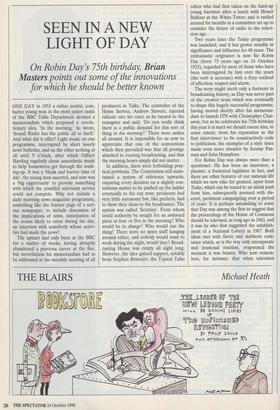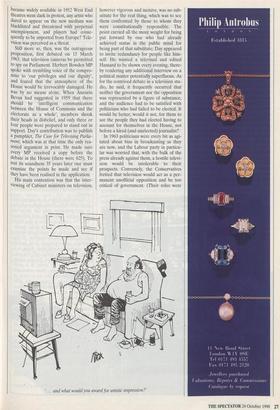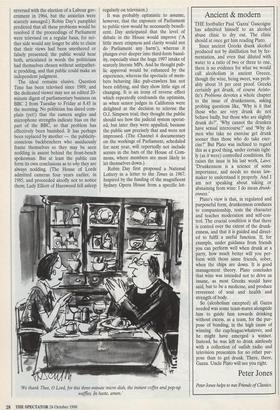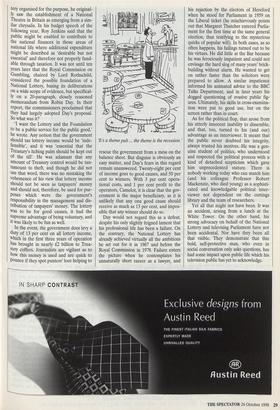SEEN IN A NEW LIGHT OF DAY
On Robin Day's 75th birthday, Brian Masters points out some of the innovations
for which he should be better known
ONE DAY in 1955 a rather zestful, com- bative young man in the most junior ranks of the BBC Talks Department devised a memorandum which proposed a revolu- tionary idea. 'In the morning,' he wrote, 'Sound Radio has the public all to itself.' And what did it offer? Light music on one programme, interrupted by short hourly news bulletins, and on the other nothing at all until 9 o'clock, after which Gilbert Harding regularly chose anaesthetic music to help housewives get through the wash- ing-up. It was a 'bleak and barren time of day', the young man asserted, and now was a `big opportunity' to provide something with which the youthful television service could not compete. Why not initiate a daily morning news magazine programme, something like the feature page of a seri- ous newspaper, to include discussion of the implications of news, anticipation of the events likely to occur during the day, an interview with somebody whose activi- ties had made the news?
The upstart had only been at the BBC for a matter of weeks, having abruptly abandoned a previous career at the Bar, but nevertheless his memorandum had to be addressed at the monthly meeting of all
producers in Talks. The controller of the Home Service, Andrew Stewart, injected ridicule into his voice as he turned to the youngster and said, 'Do you really think there is a public demand for this sort of thing in the morning?' There were smiles all around. It is impossible for us now to appreciate that one of the conventions which then prevailed was that all prestige attached to evening broadcasting, and that the morning hours simply did not matter.
In addition, there were forbidding prac- tical problems. The Corporation still main- tained a system of reference upwards, requiring every decision on a slightly con- tentious matter to be pushed up the ladder eventually to the top man; producers had very little autonomy but, like prefects, had to show their ideas to the headmaster. The system was called 'Scrutiny'. From whom could authority be sought for an awkward piece at four or five in the morning? Who would be in charge? Who would run the thing? There were no spare staff hanging around either, and nobody would want to work during the night, would they? Broad- casting House was empty all night long. However, the idea gained support, notably from Stephen Bonarjee, the Topical Talks editor who had first taken on the hard-up young barrister after a lunch with Honor Balfour at the White Tower, and it rattled around for months in a committee set up to consider the future of radio in the televi- sion age.
Two years later the Today programme was launched, and it has grown steadily in significance and influence for 40 years. The enthusiastic originator is now Sir Robin Day (born 75 years ago on 24 October 1923), regarded by most of those who have been interrogated by him over the years (the verb is accurate) with a fizzy cocktail of affection, respect and alarm.
The story might merit only a footnote in broadcasting history, as Day was never part of the creative team which was eventually to shape this hugely successful programme, having moved shortly after his memoran- dum to launch ITN with Christopher Chat- away, but as he celebrates his 75th birthday this year it is meet we should rescue him, to some extent, from his reputation as the first interviewer to be constructively rude to politicians, the exemplar of a style since made even more abrasive by Jeremy Pax- man and John Humphrys.
For Robin Day was always more than a questioner. He has been an innovator, a planner, a frustrated legislator in fact, and there are other features of our national life which we now take for granted, apart from Today, which can be traced to an initial push from him, subsequently pursued with dis- creet, persistent campaigning over a period of years. It is perhaps astonishing to some that Day was among the first to suggest that the proceedings of the House of Commons should be televised, as long ago as 1963, and it was he who first suggested the establish- ment of a National Lottery in 1967. Both ideas met with fierce and stubborn resis- tance which, as is the way with intemperate and irrational reaction, evaporated the moment it was beaten. Who now remem- bers, for instance, that when television became widely available in 1952 West End theatres went dark in protest, any artist who dared to appear on the new medium was blacklisted and threatened with perpetual unemployment, and players had conse- quently to be imported from Europe? Tele- vision was perceived as a threat.
Still more so, then, was the outrageous proposition, first debated on 15 March 1963, that television cameras be permitted to spy on Parliament. Herbert Bowden MP Spoke with trembling voice of the compro- mise to 'our privileges and our dignity', and feared that the atmosphere of the House would be irrevocably damaged. He was by no means alone. When Aneurin Bevan had suggested, in 1959 that there Should be 'intelligent communication between the House of Commons and the electorate as a whole', members shook their heads in disbelief, and only three or four people were prepared to stand out in support. Day's contribution was to publish a pamphlet, The Case for Televising Parlia- ment, which was at that time the only rea- soned argument in print. He made sure every MP received a copy before the debate in the House (there were 625). To test its soundness 35 years later one must examine the points he made and see if they have been realised in the application.
His main contention was that the inter- viewing of Cabinet ministers on television, however vigorous and incisive, was no sub- stitute for the real thing, which was to see them confronted by those to whom they were constitutionally responsible. The point carried all the more weight for being put forward by one who had already achieved status in the public mind for being part of that substitute; Day appeared to invite redundancy for people like him- self. He wanted a televised and edited Hansard to be shown every evening, there- by rendering any additional interview on a political matter potentially superfluous. As for the contrived debate in a television stu- dio, he said, it frequently occurred that neither the government nor the opposition was represented by a figure of substance, and the audience had to be satisfied with politicians who had failed to be elected. It would be better, would it not, for them to see the people they had elected having to account for themselves in the House, not before a hired (and unelected) journalist?
In 1963 politicians were every bit as agi- tated about bias in broadcasting as they are now, and the Labour party in particu- lar was worried that, with the bulk of the press already against them, a hostile televi- sion would be intolerable to their prospects. Conversely, the Conservatives fretted that television would act as a per- manent unofficial opposition and be too critical of government. (Their roles were and what would you award for artistic impression?' reversed with the election of a Labour gov- ernment in 1964, but the anxieties were scarcely assuaged.) Robin Day's pamphlet predicted that all these problems would be resolved if the proceedings of Parliament were televised on a regular basis, for nei- ther side would any longer be able to claim that their views had been smothered or falsely presented; the public would hear both, articulated in words the politicians had themselves chosen without antipathet- ic prodding, and that public could make an independent judgment.
The ideal remains elusive. Question Time has been televised since 1989, and the dedicated viewer may see an edited 20- minute digest of parliamentary business on BBC 2 from Tuesday to Friday at 8.45 in the morning. No politician has dared com- plain (yet!) that the camera angles and microphone strengths indicate bias on the part of the BBC, so that problem has effectively been banished. It has perhaps been replaced by another — the publicity- conscious backbenchers who assiduously frame themselves so they may be seen nodding in assent behind the front-bench spokesman. But at least the public can form its own conclusions as to why they are always nodding. (The House of Lords admitted cameras four years earlier, in 1985, and proceeded aloofly not to notice them; Lady Elliott of Harewood fell asleep regularly on television.) It was probably optimistic to assume, however, that the exposure of Parliament to public view would be necessarily benefi- cent. Day anticipated that the level of debate in the House would improve CA little more crispness and clarity would not do Parliament any harm'), whereas it plunges ever deeper into third-form banal- ity, especially since the huge 1997 intake of scarcely literate MPs. And he thought pub- lic approval would be enhanced by the experience, whereas the spectacle of mem- bers behaving like pub-crawlers has not been edifying, and they show little sign of changing. It is an irony of reverse effect which repeatedly confounds the optimists, as when senior judges in California were delighted at the decision to televise the O.J. Simpson trial; they thought the public should see how the judicial system operat- ed, but later they were appalled, because the public saw precisely that and were not impressed. (The Channel 4 documentary on the workings of Parliament, scheduled for next year, will reportedly not include scenes in the bars of the House of Com- mons, where members are most likely to let themselves down.) Robin Day first proposed a National Lottery in a letter to the Times in 1967. Inspired by the funding of the magnificent Sydney Opera House from a specific lot- 'We thank Thee, 0 Lord, for this three-minute micro dish, the instant coffee and pop-up waffles. In haste, amen.' tery organised for the purpose, he original- ly saw the establishment of a National Theatre in Britain as emerging from a sim- ilar chrysalis. In his budget speech of the following year, Roy Jenkins said that the Public might be enabled to contribute to the national finances in those areas of national life where additional expenditure might be described as 'desirable but not essential' and therefore not properly fund- able through taxation. It was not until ten years later that the Royal Commission on Gambling, chaired by Lord Rothschild, considered the possible foundation of a National Lottery, basing its deliberations on a wide scope of evidence, but specifical- ly on a 20-paragraph, closely reasoned memorandum from Robin Day. In their report, the commissioners proclaimed that they had largely adopted Day's proposal. So what was it?
'I want the Lottery and the Foundation to be a public service for the public good,' he wrote. Any notion that the government should tax lottery income would be 'inde- fensible', and it was 'essential that the Treasury's itching palm should be kept out of the till'. He was adamant that any amount of Treasury control would be tan- tamount to theft, and though he did not use that word, there was no mistaking the vehemence of his view that lottery income Should not be seen as taxpayers' money and should not, therefore, be used for pur- poses which were the government's responsibility in the management and dis- tribution of taxpayers' money. The lottery was to be for good causes, it had the supreme advantage of being voluntary, and it was likely to be fun as well.
In the event, the government does levy a duty of 13 per cent on all lottery income, Which in the first three years of operation has brought in nearly £2 billion to Trea- sury coffers. Journalists are vigilant as to how this money is used and are quick to Pounce if they spot punters' loot helping to 'It's a theme pub ... the theme is the recession.'
rescue the government from a mess on the balance sheet. But disguise is obviously an easy matter, and Day's fears in this regard remain unanswered. Twenty-eight per cent of income goes to good causes, and 50 per cent to winners. With 3 per cent opera- tional costs, and 1 per cent profit to the operators, Camelot, it is clear that the gov- ernment is the major beneficiary, as it is unlikely that any one good cause should receive as much as 13 per cent, and impos- sible that any winner should do so.
Day would not regard this as a defeat, despite his only slightly feigned lament that his professional life has been a failure. On the contrary, the National Lottery has already achieved virtually all the ambitions he set out for it in 1967 and before the Royal Commission in 1978. Failure enters the picture when he contemplates his unnaturally short career as a lawyer, and his rejection by the electors of Hereford when he stood for Parliament in 1959 on the Liberal ticket (he mischievously points out that Margaret Thatcher entered Parlia- ment for the first time at the same general election, thus testifying to the mysterious quirks of popular will). In both cases, as so often happens, his failings turned out to be his virtues. He did little at the Bar because he was ferociously impatient and could not envisage the hard slog of many years' brick- building without alarm. He wanted to get on rather faster than the solicitors were prepared to allow. A similar impatience informed his animated advice to the BBC Talks Department, and in later years his dogged questioning of evasive public fig- ures. Ultimately, his skills in cross-examina- tion were put to good use, but on the screen rather than in court.
As for the political flop, that arose from his utterly innocent inability to dissemble, and that, too, turned to his (and our) advantage as an interviewer. It meant that the public never doubted his integrity, always trusted his motives. .He was a gen- uine student of politics, who understood and respected the political process with a kind of detached scepticism which gave him unprecedented stature. There is nobody working today who can match him (and his colleague Professor Robert Mackenzie, who died young) as a sophisti- cated and knowledgable political inter- viewer not dependent on the cuttings library and the team of researchers.
Yet all that might not have been. It was an accident, arising from a lunch at the White Tower. On the other hand, his strong advocacy on behalf of the National Lottery and televising Parliament have not been accidental. Nor have they been all that visible. They demonstrate that this bold, self-protective man, who even in social conversation only asks questions, has had some impact upon public life which his television public has yet to acknowledge.





















































































 Previous page
Previous page